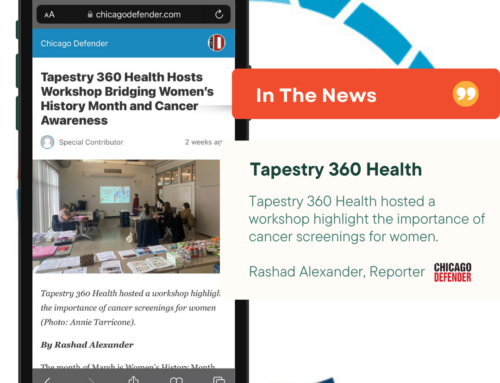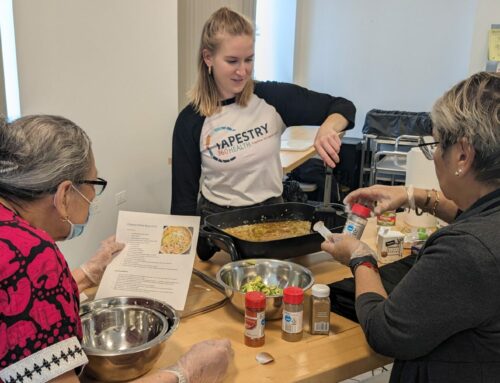News
Shining a Light on Black Maternal Health: Why Awareness is Crucial

In the journey of motherhood, every woman deserves the utmost care and support. However, when it comes to maternal health, alarming disparities persist, particularly affecting Black mothers. At Tapestry 360 Health, we recognize the urgency of addressing the disparities in Black maternal health. Our mission extends beyond providing medical care; we are dedicated to advocating for equitable healthcare practices and raising awareness about Black maternal health issues. Through community outreach programs, educational initiatives, and collaboration with stakeholders, we strive to bridge the gaps in maternal healthcare access and quality.
Understanding the Crisis:
Statistics paint a stark reality: Black women in the United States are three to four times more likely to die from pregnancy-related complications than white women. These disparities persist regardless of income or education level, indicating systemic issue
s deeply rooted in healthcare structures.
Multiple factors contribute to these alarming statistics. Structural racism within healthcare systems, implicit biases among healthcare providers, socioeconomic disparities, and inadequate access to quality care all play significant roles. These disparities manifest in higher rates of pregnancy-related complications, including preterm birth, low birth weight, and maternal mortality among Black women.
Importance of Prenatal Care:
Prenatal care plays a crucial role in ensuring the health and well-being of both mother and child. Regular prenatal check-ups enable healthcare providers to monitor the progress of the pregnancy, identify any potential complications early on, and provide necessary interventions. For Black mothers, accessing timely and culturally competent prenatal care can significantly mitigate the risks associated with pregnancy and childbirth.
Addressing Mental Health:
Maternal health encompasses not only physical well-being but also mental and emotional wellness. Pregnancy and childbirth can bring about a range of emotions, and it’s essential for mothers to have access to mental health support when needed. This is why we prioritize mental health services for expectant and new mothers, offering counseling, support groups, and resources to address perinatal mood and anxiety disorders.
Diversity in Healthcare:
Recognizing the importance of diversity in healthcare, we are committed to building a workforce that reflects the communities we serve. By fostering a diverse and inclusive environment, we ensure that all patients, regardless of race or ethnicity, receive culturally competent care that respects their unique needs and experiences.
As we continue our efforts to address the crisis of Black maternal health, we urge you to join us in spreading awareness and advocating for change. Share information, engage in conversations, and support organizations working towards equity in maternal healthcare. Together, we can create a future where every mother receives the care and support she deserves.
In the journey of motherhood, every woman deserves the utmost care and support. However, when it comes to maternal health, alarming disparities persist, particularly affecting Black mothers. At Tapestry 360 Health, we recognize the urgency of addressing the disparities in Black maternal health. Our mission extends beyond providing medical care; we are dedicated to advocating for equitable healthcare practices and raising awareness about Black maternal health issues. Through community outreach programs, educational initiatives, and collaboration with stakeholders, we strive to bridge the gaps in maternal healthcare access and quality.
Understanding the Crisis:
Statistics paint a stark reality: Black women in the United States are three to four times more likely to die from pregnancy-related complications than white women. These disparities persist regardless of income or education level, indicating systemic issue
s deeply rooted in healthcare structures.
Multiple factors contribute to these alarming statistics. Structural racism within healthcare systems, implicit biases among healthcare providers, socioeconomic disparities, and inadequate access to quality care all play significant roles. These disparities manifest in higher rates of pregnancy-related complications, including preterm birth, low birth weight, and maternal mortality among Black women.
Importance of Prenatal Care:
Prenatal care plays a crucial role in ensuring the health and well-being of both mother and child. Regular prenatal check-ups enable healthcare providers to monitor the progress of the pregnancy, identify any potential complications early on, and provide necessary interventions. For Black mothers, accessing timely and culturally competent prenatal care can significantly mitigate the risks associated with pregnancy and childbirth.
Addressing Mental Health:
Maternal health encompasses not only physical well-being but also mental and emotional wellness. Pregnancy and childbirth can bring about a range of emotions, and it’s essential for mothers to have access to mental health support when needed. This is why we prioritize mental health services for expectant and new mothers, offering counseling, support groups, and resources to address perinatal mood and anxiety disorders.
Diversity in Healthcare:
Recognizing the importance of diversity in healthcare, we are committed to building a workforce that reflects the communities we serve. By fostering a diverse and inclusive environment, we ensure that all patients, regardless of race or ethnicity, receive culturally competent care that respects their unique needs and experiences.
As we continue our efforts to address the crisis of Black maternal health, we urge you to join us in spreading awareness and advocating for change. Share information, engage in conversations, and support organizations working towards equity in maternal healthcare. Together, we can create a future where every mother receives the care and support she deserves.















